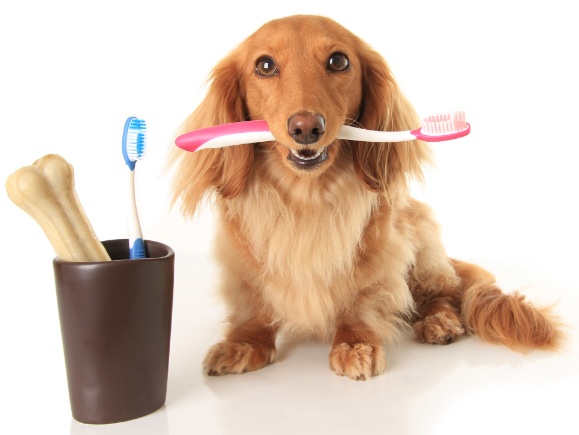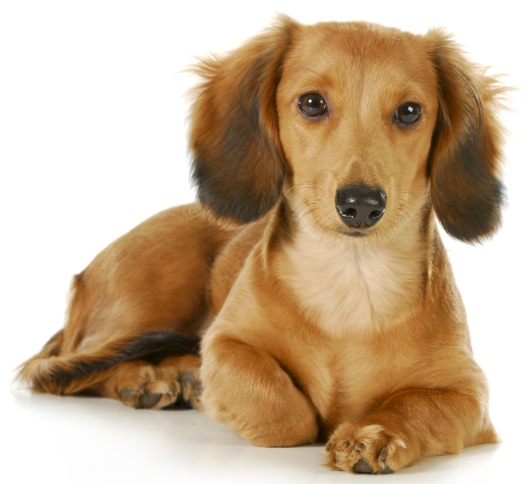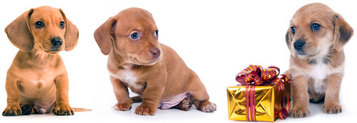Your mini Dachshund needs help brushing their teeth. Like any dog, they can get cavities, periodontal disease, and they build up plaque and tartar on their teeth just like us. Your Dachshund should have his teeth brushed everyday — this will also help to keep your Dachshund’s breath fresh!
Get your Dachshund used to touching their teeth and gums: some owners start by rubbing their teeth with meat, helping them to get more comfortable with your hands in their mouth. Use canine toothpaste that you can get at any pet food store — start this at a young age, when your Dachshund is a puppy. Canine toothpastes are designed to taste yummy to dogs and they are edible (OK to swallow, which they usually do!) — never use human toothpaste! Most toothpastes made for dogs come in flavors such as chicken, beef or peanut butte — your dog will enjoy the taste and may even think of it as a treat. Once your mini Dachshund is comfortable with having his teeth touched it’s time for the actual teeth-brushing.
Brushing your Dachshund’s teeth
Place some more toothpaste on your finger and gently rub it on the dog's teeth and gums. If the dog doesn't struggle, work your way from the front to the back teeth. Repeat this process on a daily basis until the dog seems to be comfortable with it. Each time the dog allows you to clean its teeth with your finger, lavish it with praise and give it a treat or play reward.
Get out the toothbrush and sit or kneel beside the dog. Avoid holding the dog down, which can be a negative experience for your Dachshund. Put a small amount of toothpaste onto the toothbrush and then gently place your hand over the top of the dog's muzzle and lift its lips on one side, revealing the teeth.
Hold the toothbrush at a 45-degree angle and use small, circular strokes over the teeth and gums, brushing both the top and bottom teeth. A small amount of gum bleeding is normal, but if there is a large amount of blood, contact your veterinarian.
When you're finished, give a treat or go outside to play. Doing so will help the dog to view this as a positive experience. Increase the frequency of brushing as your dog becomes more comfortable with it — you will want to brush your dog's teeth on a daily basis to keep its teeth and gums healthy.
Get your Dachshund used to touching their teeth and gums: some owners start by rubbing their teeth with meat, helping them to get more comfortable with your hands in their mouth. Use canine toothpaste that you can get at any pet food store — start this at a young age, when your Dachshund is a puppy. Canine toothpastes are designed to taste yummy to dogs and they are edible (OK to swallow, which they usually do!) — never use human toothpaste! Most toothpastes made for dogs come in flavors such as chicken, beef or peanut butte — your dog will enjoy the taste and may even think of it as a treat. Once your mini Dachshund is comfortable with having his teeth touched it’s time for the actual teeth-brushing.
Brushing your Dachshund’s teeth
Place some more toothpaste on your finger and gently rub it on the dog's teeth and gums. If the dog doesn't struggle, work your way from the front to the back teeth. Repeat this process on a daily basis until the dog seems to be comfortable with it. Each time the dog allows you to clean its teeth with your finger, lavish it with praise and give it a treat or play reward.
Get out the toothbrush and sit or kneel beside the dog. Avoid holding the dog down, which can be a negative experience for your Dachshund. Put a small amount of toothpaste onto the toothbrush and then gently place your hand over the top of the dog's muzzle and lift its lips on one side, revealing the teeth.
Hold the toothbrush at a 45-degree angle and use small, circular strokes over the teeth and gums, brushing both the top and bottom teeth. A small amount of gum bleeding is normal, but if there is a large amount of blood, contact your veterinarian.
When you're finished, give a treat or go outside to play. Doing so will help the dog to view this as a positive experience. Increase the frequency of brushing as your dog becomes more comfortable with it — you will want to brush your dog's teeth on a daily basis to keep its teeth and gums healthy.



 RSS Feed
RSS Feed
